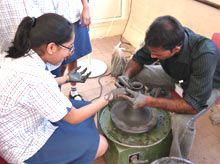Leading by example
01 February, 2009 | The Times of India
ShareMrs. Neerja Birla, Vice Chairperson
Education Projects, Aditya Birla Group
The Times of India
 Across all religions in the world, there is this strong and true belief that children have divinity in them and that they are God’s most beautiful creation. There is a symbiotic connect between children and teachers. They are blessed and truly in a position to mould the lives of so many children. They are like potters and students, like the clay. Teaching is a huge responsibility and should be a calling.
Across all religions in the world, there is this strong and true belief that children have divinity in them and that they are God’s most beautiful creation. There is a symbiotic connect between children and teachers. They are blessed and truly in a position to mould the lives of so many children. They are like potters and students, like the clay. Teaching is a huge responsibility and should be a calling.
Education, in my dictionary, far transcends academic excellence. It is not about running a race with your classmates and topping the list — it is about soaking in all the knowledge gained during the process, it is about translating that knowledge into wisdom and about applying that wisdom. It is about excellence. It is about running a race with yourself and emerging a winner in your own eyes.
I believe that the most critical task today is that of building character. For teachers, it entails veering teaching in a manner that you are actually engaging in character education. As we are, our children too face tremendous pressure in their own lives. They have to cope with expectations of their teachers, meet the standards of their parents, and also confirm to the peer group pressures and habits. These are virtually three different worlds and they constantly straddle between these worlds. They have to make hundreds of choices, from thousands of options in millions of areas everyday.
These pressures manifest themselves in different forms – early drug addiction, childhood pregnancies, killings on the campus, internet hacking and many such forms of self chosen stress-busters. Teachers spend a lot of time with the children. They must keep their antennas up to recognise sensitive signals of stress that children undergo. The better they are at this, the greater the good they can do for them. Teachers need to remain clued into the state of mind of children by picking up their behavioural signals.
 One might argue that the parents should be the bedrock of values, but today, with both parents working and families being nuclear, unfortunately the focus is not on these softer and key aspects but rather on studies and grades. Sometimes parents feel that values are a given. But these need to be made explicit. Values give meaning to life. They give a person his identity and character. Since a child spends a large part of his time at school, the responsibility of nurturing the child holistically and building his character rests equally with his teachers who are his mentors.
One might argue that the parents should be the bedrock of values, but today, with both parents working and families being nuclear, unfortunately the focus is not on these softer and key aspects but rather on studies and grades. Sometimes parents feel that values are a given. But these need to be made explicit. Values give meaning to life. They give a person his identity and character. Since a child spends a large part of his time at school, the responsibility of nurturing the child holistically and building his character rests equally with his teachers who are his mentors.
Teachers should instill some values in children such as honesty and integrity, a sense of self-worth, taking responsibility, tolerance, compassion, respecting divergent opinions, humility and of course, self-discipline. Only then a child grows up to be a caring and a well balanced human-being. At the end of the day, as Ralph Waldo Emerson put it, “Character is everything”. If we have to teach values to children, we must realise that we ourselves – as educators, as teachers, have to be role models. As the old adage goes, we have to practice what we preach. So teachers have to lead by example.
Teachers are the sailors who point out the lighthouse. It is up to us to teach them to think beyond themselves. Teach them that on the contrary there is far greater joy in giving than in receiving and in caring for others. It does help to give a spiritual tenor to your teachings. Teaching children to recognise spiritual values from their infancy provides a bridge to a well balanced life as they grow up.
What else can we, as educators, teach that will stand our students in good stead through their lives? As education is also about equipping students with life-management skills — to focus on their goals and live value-centred lives — we must give this a sharper focus.
Impress upon them that all of us — children, parents, teachers — do not exist in isolation; we live in an interdependent society. Teach them to recognise this and have respect for others. Only if they learn to respect themselves, they will respect others. They must be taught to respect divergent views. Not having this perspective of respect is the bane of today’s society, where we see so many warring factions.
Most important is making the student believe in himself. If he has faith on the pillar of faith, in himself, you can embed in students “the can-do” attitude. The ultimate objective of all this is to instill in children a deep sense of self-belief that comes through deeply instilled values and a spirit that seeks excellence. Give them wings and empowerment.
I remember an evening that I spent with some of my friends. One of them was discussing her 12-year-old son’s report. His physics report card read “8 per cent, effortlessly achieved”! Can you imagine how such a remark from the teacher would lower a child’s self esteem?
Another area of concern is discipline. Today, unfortunately discipline is synonymous with punishment. Punishment can only lead to anger in the child, defiance and sometimes c;reates fear. Let us replace punishment with love and kindness, by teaching children about the consequences and owning responsibility of the consequences.
 Taking responsibility for the consequences will enhance the understanding of the child without causing any negative emotions and will seek to resolve the problems immediately.
Taking responsibility for the consequences will enhance the understanding of the child without causing any negative emotions and will seek to resolve the problems immediately.
It is important to impress upon children the need to learn from mistakes as those very mistakes are the stepping stones to success. A story that always inspires me, which I tell my children often, is about Edison who failed 99 times before he invented the bulb. With each attempt, he learnt something about what not to do which is what made him succeed in his hundredth attempt.
Let us nurture our students into well rounded individuals and leaders, who excel in whatever they choose to do, with a great sense of values.
It is important for all of us to look together at the opportunity that the road to holistic education provides. Let us go ahead, firm in our resolve and steadfast in our commitment to make a difference.






